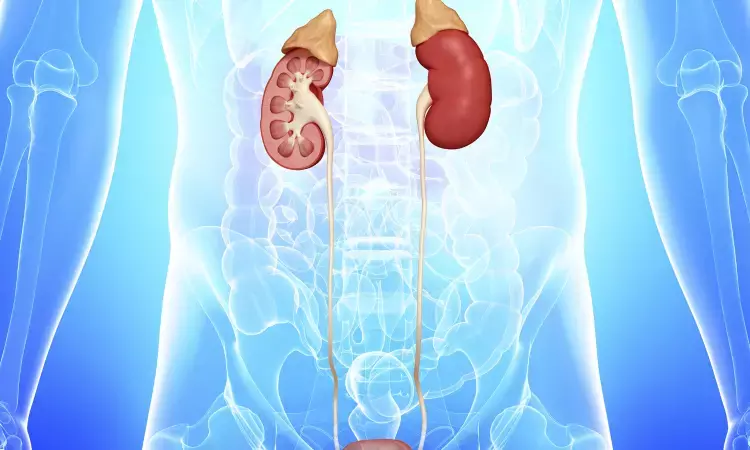- Home
- Medical news & Guidelines
- Anesthesiology
- Cardiology and CTVS
- Critical Care
- Dentistry
- Dermatology
- Diabetes and Endocrinology
- ENT
- Gastroenterology
- Medicine
- Nephrology
- Neurology
- Obstretics-Gynaecology
- Oncology
- Ophthalmology
- Orthopaedics
- Pediatrics-Neonatology
- Psychiatry
- Pulmonology
- Radiology
- Surgery
- Urology
- Laboratory Medicine
- Diet
- Nursing
- Paramedical
- Physiotherapy
- Health news
- Fact Check
- Bone Health Fact Check
- Brain Health Fact Check
- Cancer Related Fact Check
- Child Care Fact Check
- Dental and oral health fact check
- Diabetes and metabolic health fact check
- Diet and Nutrition Fact Check
- Eye and ENT Care Fact Check
- Fitness fact check
- Gut health fact check
- Heart health fact check
- Kidney health fact check
- Medical education fact check
- Men's health fact check
- Respiratory fact check
- Skin and hair care fact check
- Vaccine and Immunization fact check
- Women's health fact check
- AYUSH
- State News
- Andaman and Nicobar Islands
- Andhra Pradesh
- Arunachal Pradesh
- Assam
- Bihar
- Chandigarh
- Chattisgarh
- Dadra and Nagar Haveli
- Daman and Diu
- Delhi
- Goa
- Gujarat
- Haryana
- Himachal Pradesh
- Jammu & Kashmir
- Jharkhand
- Karnataka
- Kerala
- Ladakh
- Lakshadweep
- Madhya Pradesh
- Maharashtra
- Manipur
- Meghalaya
- Mizoram
- Nagaland
- Odisha
- Puducherry
- Punjab
- Rajasthan
- Sikkim
- Tamil Nadu
- Telangana
- Tripura
- Uttar Pradesh
- Uttrakhand
- West Bengal
- Medical Education
- Industry
Short-Term Foley Catheters fail to Reduce chances of Urinary Retention after Primary THA and TKA

Researchers from Rush University Medical Center, Chicago, Illinois, in their research article entitled "Short-Term Indwelling Foley Catheters Do Not Reduce the Risk of Postoperative Urinary Retention in Uncomplicated Primary THA and TKA” published in The Journal of Bone and Joint Surgery demonstrated whether a short-term Foley catheter (inserted in the operating room and removed upon arrival to the orthopaedic floor) would reduce the risk of postoperative urinary retention (POUR) in patients undergoing total hip (THA) and total knee arthroplasty (TKA). According to the study, utilizing a short-term Foley catheter during surgery and removal upon transfer to the orthopaedic floor does not lower the POUR rate.
228 TKA patients and 160 TKA patients were randomized to receive a short-term Foley catheter (143 male and 245 female). POUR was the primary outcome measured. UTI or urinary tract infections (within three weeks) and requirement of ≥1 straight catheterization. were secondary outcomes
The study results could be summarised as follows:
- Nine patients developed POUR, four in the short-term Foley group and 5 in the control group, 2.1% versus 2.6%.
- Males were more prone to develop POUR compared to females (88.9% versus 11.1%)
- 10 in the Foley group and 14 in the control group, 5.2% versus 7.2%, required ≥1 straight catheterization
- 3 in the Foley group and 1 in the control group, 1.5% versus 0.5% developed UTIs on intention-to-treat analysis
- Four in the Foley group and none in the control group developed UTIs (2.1% versus 0.0%) on as-treated analysis.
Concluding further, they wrote that using a short-term Foley catheter inserted in the operating room and removed on arrival to the orthopaedic floor does not decrease the rate of POUR.
Further reading:
Weintraub, Matthew T. BS1; Yang, JaeWon MD1; Nam, Denis MD, MSc1,a; Greenspoon, Joshua A. MD1; DeBenedetti, Anne MSc1; Karas, Vasili MD, MS1; Mehta, Neal MD2; Della Valle, Craig J. MD1. Short-Term Indwelling Foley Catheters Do Not Reduce the Risk of Postoperative Urinary Retention in Uncomplicated Primary THA and TKA: A Randomized Controlled Trial. The Journal of Bone and Joint Surgery 105(4):p 312-319, February 15, 2023. | DOI: 10.2106/JBJS.22.00759
BDS, MDS in Periodontics and Implantology
Dr. Aditi Yadav is a BDS, MDS in Periodontics and Implantology. She has a clinical experience of 5 years as a laser dental surgeon. She also has a Diploma in clinical research and pharmacovigilance and is a Certified data scientist. She is currently working as a content developer in e-health services. Dr. Yadav has a keen interest in Medical Journalism and is actively involved in Medical Research writing.
Dr Kamal Kant Kohli-MBBS, DTCD- a chest specialist with more than 30 years of practice and a flair for writing clinical articles, Dr Kamal Kant Kohli joined Medical Dialogues as a Chief Editor of Medical News. Besides writing articles, as an editor, he proofreads and verifies all the medical content published on Medical Dialogues including those coming from journals, studies,medical conferences,guidelines etc. Email: drkohli@medicaldialogues.in. Contact no. 011-43720751


